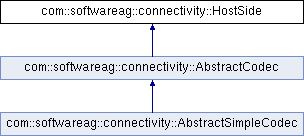An interface to the next component (plugin or host) towards the host. More...
#include <sag_connectivity_plugins.hpp>

Public Types | |
| typedef std::unique_ptr< HostSide > | ptr_t |
| Pointers to HostSides should always be this ptr_t type, which is a std::unique_ptr. More... | |
Public Member Functions | |
| virtual | ~HostSide () |
| Ensure virtual destruction. More... | |
| virtual void | sendBatchTowardsHost (Message *start, Message *end)=0 |
| Abstract method that must be implemented to handle delivery of a batch of messages heading towards the host. More... | |
| void | sendBatchTowardsHost (Message &&message) |
| Overload for sending a batch containing a single message. More... | |
| template<typename IT > | |
| auto | sendBatchTowardsHost (const IT &begin, const IT &end) -> typename std::enable_if< !std::is_const< ampl::remove_ref_t< decltype(*begin)>>::value &&l::is_same< Message, ampl::remove_const_t< ampl::remove_ref_t< decltype(*begin)>>>::value, void >::type |
| Overload for sending messages using an iterator range. More... | |
Detailed Description
An interface to the next component (plugin or host) towards the host.
Contains the method to send messages towards the host.
Member Typedef Documentation
◆ ptr_t
| typedef std::unique_ptr<HostSide> com::softwareag::connectivity::HostSide::ptr_t |
Pointers to HostSides should always be this ptr_t type, which is a std::unique_ptr.
Constructor & Destructor Documentation
◆ ~HostSide()
|
inlinevirtual |
Ensure virtual destruction.
Member Function Documentation
◆ sendBatchTowardsHost() [1/3]
|
pure virtual |
Abstract method that must be implemented to handle delivery of a batch of messages heading towards the host.
Messages should be processed and passed to the next connectivity plug-in in the chain, which is typically provided by the Transport's or Codec's hostSide pointer.
Implementors of this method are permitted to modify the contents of the messages (for example a codec may apply transformations to messages sent from a transport or host), though not to delete them.
The ability to handle messages in batches is provided to allow amortising the costs of delivering messages. The batch is defined as all Messages from start up to but excluding end. The callee may modify the messages, typically by moving their contents elsewhere.
Threading: Plug-ins are required to ensure that they do not call into the next plug-in in their chain from more than one thread concurrently (although it does not have to be the same thread each time). Plug-ins may therefore assume that no additional locking is required in this method to protect access to the plug-in's state. The plug-in should be as responsive as possible to the Plugin.shutdown() method, which may be called at any time on any thread, and should result in any calls into this unblocking and returning promptly. If this method throws then the exception will be logged and the batch of messages dropped.
Implemented in com::softwareag::connectivity::AbstractSimpleCodec.
◆ sendBatchTowardsHost() [2/3]
|
inline |
Overload for sending a batch containing a single message.
As sendBatchTowardsHost(Message*, Message*), but allows a single message to be sent.
- Since
- 10.2
◆ sendBatchTowardsHost() [3/3]
|
inline |
Overload for sending messages using an iterator range.
As sendBatchTowardsHost(Message*, Message*), but allows bidirectional iterators over Messages to be used.
Thus, can use std::vector<Message> msgs; sendBatchTowardsHost(msgs.begin(), msgs.end());
- Since
- 10.2
The documentation for this class was generated from the following file:
